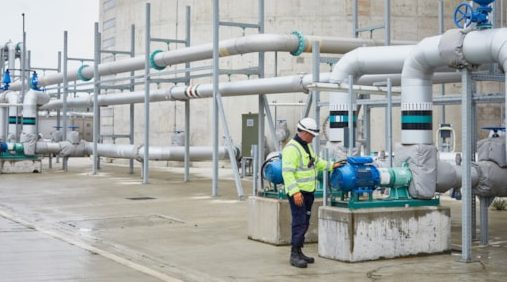Yorkshire Water is to lead a consortium investing £2.3m from the Ofwat Innovation Fund to convert sewage sludge into usable products such as biochar, vitrified ash ‘stones’ and a hydrogen-rich synthesis gas in a process capable of destroying contaminants such as forever chemicals and microplastics.
The ground-breaking work involves Advanced Thermal Conversion Gasification technology, and involves technology provider Enertecgreen, Queen’s University Belfast, Carbon Trust, Thames Water, United Utilities, Anglian Water, Scottish Water, Irish Water, Northern Ireland Water, Southern Water, and Wessex Water.
If successful, the project will demonstrate the circular economy in action by testing the use of the biochar as a wastewater treatment media and also as an additive in brick manufacturing.
The carbon-rich biochar, which looks like small pieces of charcoal, could be used as a soil improver to increase water and nutrient retention, and as it doesn’t readily decompose, it’s also a vehicle for sequestering carbon in soil.
The vitrified ash ‘stones’ could be used as aggregate in the construction industry to reduce the embodied carbon footprint. The syngas – a blend of hydrogen, carbon monoxide, carbon dioxide and methane – can be used to produce green electricity, along with other high-value products such as aviation fuel.
Dr Danielle Hankin, innovation programme manager at Yorkshire Water, said: “Converting sewage sludge into gas, biochar and ash ‘stones’ opens up new, more sustainable uses for this waste product. We’re proud to be pre-empting changes in legislation and consumer attitudes, by delivering a groundbreaking technology that benefits customers, the environment and future-proofs the water industry.
“Once proven, the Gasification process will produce sustainable wastewater treatment media and construction material, generate green electricity, and could create high-value products such as biomethanol, aviation fuel or hydrogen. Our work represents a pivotal step in driving the UK towards a greener, more resource-efficient future.”
Ofwate senior director Helen Campbell said: “There are big challenges in the water industry that must be solved, some are well known and others are less so. In our fourth Water Breakthrough Challenge we called for solutions with potential to deliver wide-scale, transformational change for customers, society and the environment – and that’s exactly what today’s winners have done. From raingardens to prevent flooding to green energy from treated sewage, innovations to cut the water sector’s carbon footprint to robots that patrol the pipe network, the winners are all helping shape a more sustainable and efficient water sector.”



